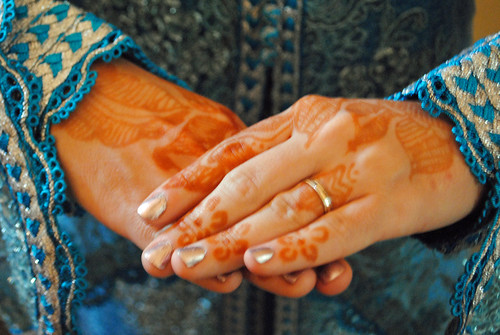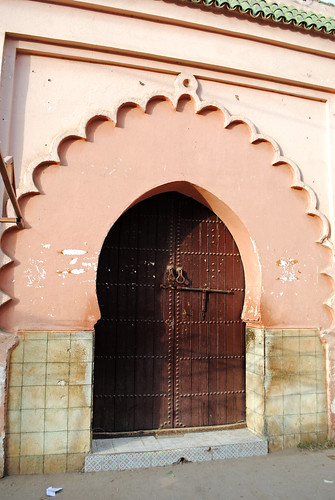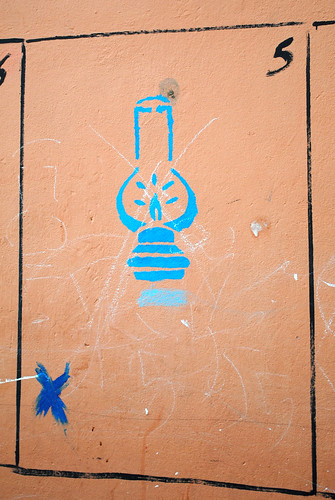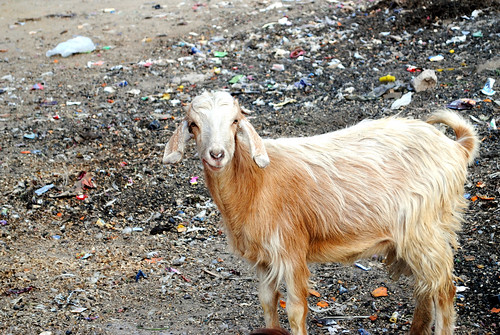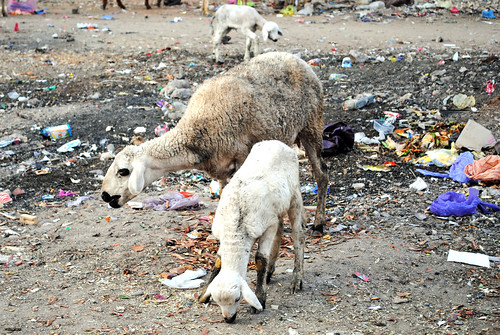wllf means to adjust, become accustomed to or get used to, and it’s been the watchword of month three. All month long, my host family, my
mudir, the mothers of the children at my Dar Šabab, the women at the hamam – everyone - would ask me, “
Weš wllfti?” Have you adjusted yet?
“
Lla mazel,” I tell them. “
Šwiya b šwiya, kan-wllf.” Not yet. Little by little, I’m adjusting.
We were sworn in as Peace Corps Volunteers on November 17th in Rabat, the capital of Morocco. That morning, we visited the Peace Corps offices (which are in a beautiful converted French style villa surrounded by a huge garden) and met the entire staff before being walked to to the Ministry of Youth and Sports (the government agency YD volunteers work with) to be sworn in. The Peace Corps Country Director, Minister of Youth and Sports and the American ambassador to Morocco all spoke, and Sairah, the best Darija speaker in our staj, gave a speech in Arabic. And then we were volunteers and after two months of being coddled by Peace Corps staff, we were on our own.
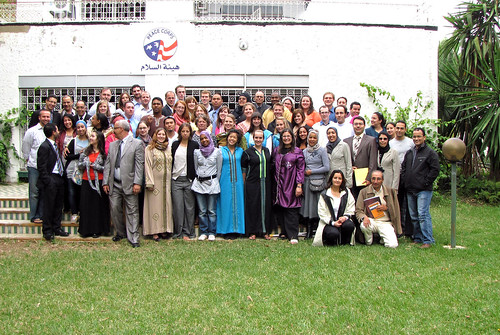
September 2011 YD Staj, just before swearing inIt was up to us to figure out how to get to our sites. I was lucky; I have sitemates, so I was wasn’t alone, and we could take a direct train from Rabat to Ben Guerir, home of my fellow PCVs Kelly and Bryant and only a 35 minute taxi ride away from Kalaa. We were accompanied to Ben Guerir by Bryant’s host brother, who helped us catch the train, walked us to the taxi stand and even negotiated the price of our tickets, but things were a bit more difficult once we arrived in Kalaa. I called my new host sister, Olayya, when we arrived, but the conversation mostly consisted of me saying, “
Audi, audi. Smhi li mafhmš.” Repeat that, repeat that. I’m sorry, I don’t understand. Turns out, speaking Arabic on the phone is much more difficult than in person. I eventually understood that Olayya wanted me to take a taxi to one of the local high schools and call her once I got there, but when I was dropped off at the front gates, my phone was out of credit. I was alone on a small, mostly deserted back road at dusk, weighed down with luggage, with no way of reaching the only person who knew where I was.
I considered sitting down on the curb and crying, but that would have gotten my pants all muddy, so my luggage and I walked until I found a hanut that sold recharge credit for my phone. And okay, so the haunt wasn’t far, and thanks to the Peace Corps phone plan that allows me to call staff and other volunteers for free, I wasn’t actually cut off from help, but at the time, the situation was horribly overwhelming.
The first few days at site were similarly difficult and overwhelming, much more so than I thought they would be. My host family, while wonderfully kind people, were little help with the innumerable official things I needed to do to establish myself in Kalaa, and I spent the morning of my first full day in Kalaa wandering around by myself in a futile attempt to find the correct police station to present my residence papers, trying desperately to blink back tears because, dammit, I was
not going to be the foreign girl crying on the side of the road. My mudir proved similarly unhelpful and didn’t even show up at the Dar Šabab my first day Kalaa. The accent and some of the vernacular in Kalaa is different from the Fes area, and when I first arrived, I couldn’t understand anything. I spent a lot of my first week in Kalaa on the phone with friends in other sites and going to bed ridiculously early.
And then, slowly, I started to
wllf.
I went to the Dar Šabab every night to meet the youth and learn the schedule. I sat in on the music club and the scout meetings and tried to talk to the kids who showed up for clubs or to use the soccer field behind the building. My fourth or fifth day at the Dar Šabab, I was sitting in the auditorium with the music club and one of the members jerked his head in my direction and asked, “Who is she?”
The girls I was sitting next to said, “She’s an American who lives in Kalaa.”
“Does she speak French,” he asked.
“No,” the boys I had been talking to before class told him. “She speaks English and is learning Arabic.”
I coughed to hide my grin. At least the youth at the Dar Šabab are starting to learn who I am.
I’m slowly getting to know people in my community. My first night at the Dar Šabab, Naoel and Hayat, two girls I met at the Dar Šabab (and I use girl lightly, since they’re my age) invited me to their grandmother’s house for dinner, and I spent the evening being force fed dates and harira by a woman who instructed me to call her my black Moroccan grandmother. Hayat and Naoel both speak decent English, their uncle speaks fluent Spanish (and while my Spanish is pretty jacked up, especially after a few months in Morocco, my Spanish comprehension is still pretty high), and for the first time since I arrived in site, I was able to actually have a real conversation and understand people without difficulty.
I’ve started teaching at my Dar Šabab, which is a government run youth center. The government maintains the building and pays for one staff member, but volunteers run most of the programs. Peace Corps warned us that most volunteers don’t have much activity during the first few months in site. In fact, we are encouraged to not commit to too much, because we need time to intergrade with our community and settle down. My
mudir, however, had other plans, and as soon as I (finally) met him, he wanted to know how often I could teach.
“Well,” I said, "I suppose to work five days a week, but right now I'm actually pretty busy so maybe in a few weeks...."
“Good, you can teach five classes a week,” he said, and before I knew it, I was teaching pretty much every moment the Dar Šabab was open.
Well, I thought to myself,
there probably won’t be that many students. Everyone says this is a bad time of year to start an activity. My Dar Šabab, however, is right next to a high school, and thanks to advertising at the high schools, my classes are popular. A little too popular, and I wish I'd had more time to think through what I want my schedule to be, but I’ll have time to rearrange things in the new year, and I’m glad I have enough work and students to keep me busy.
My first Friday in Kalaa, November 25th, was Election Day. On February 20th, as part of the Arab Spring, there were (mostly peaceful) mass demonstrations in Morocco calling for government reform, democratic change and Berber rights. On March 9th, King Mohammed announced “comprehensive constitutional reform” and then on July 1st, a series of constitutional reforms that limited the power of the monarchy were announced. Parliamentary elections were set for November 25th, and for the first time, the King would be forced to choose a Prime Minister from the winning party. (I am obviously simplifying things greatly.)
On Election Day, my host mother and sister invited me to come along when they went to vote. Even though the high school behind their house was a polling place, and several of my host siblings and my host father were assigned to vote there, my host mother and Olayya were assigned to vote at a different school that was much farther away. The polling booth was disorganized; there were six rooms dedicated to voting and each room had a list of residents who were suppose to vote there, but there were no signs to help people figure out which room was the correct room for them to vote in. My host mother and Olayya had to wait in line in each room so they could ask the voting officials if this was the correct room. My host mother found the correct room fairly quickly and voted. She showed her ID, was given a paper ballot, which she took to a table that was hidden by a curtain, made her vote and then dropped the ballot into a locked glass box sitting on the table with the voting officials. Olayya, however, wasn’t able to find the correct room. She talked to the officials in each room – twice – but there no one had a record of her and eventually she gave up and we left without her getting to vote. However, despite the occasional screw-ups, the election was widely considered to be a success and it’s heartening to see at least one Arab country making change without widespread violence or destabilization.
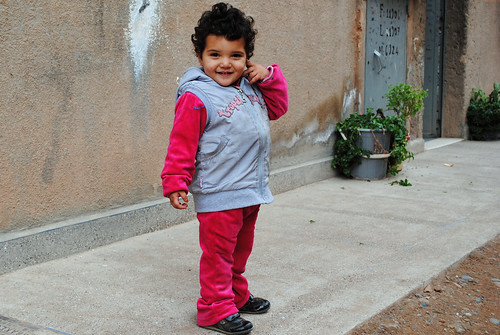
My new host family is big, which is good because I like families. This is Zainab, my almost two year old host niece who is over at our house almost every day. She is a adorable, and was a great ice breaker when I first arrived, because you don't need a common language to play with a toddler.
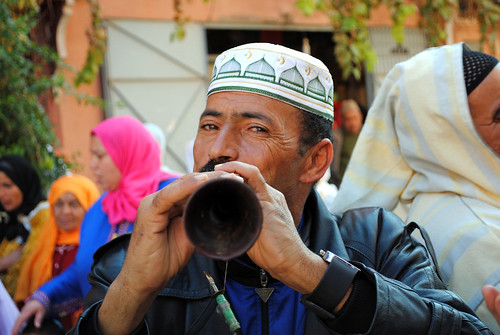
My neighbors were married a few weeks ago, and while I slept through the actual wedding, I went to the moving-in ceremony the next day. While the wedding guests and neighbors helped the new couple move the cartloads of presents into their new house, a band played music and other guests danced outside of the building. The nafir player especially was a character.
 1) It's 116° (47°) in my town today. Just in case anyone was wondering. I haven't bought a fan yet (and now it's too hot to walk to a store and buy one), and it's surprisingly not as terrible as you might think. I even managed to stand over a stove and cook tortillas this afternoon and not die although, not gonna lie, I was really grateful it was a small batch. (PC emailed a warning about the heatwave on Friday, which is nice of them, I guess, but I managed to freak myself out about the heat Friday evening, and worrying about the heat was a lot worse than the actual heat.) That being said, I'm definitely not leaving my house before dusk and I slept on my roof in just my underwear and a tanktop last night. (I've resigned myself to being caught in a state of undress on my roof by my neighbors. It will be embarrassing, but more embarrassing for them than me, so there you go.) Anyway, it's very hot, and the heat wave is suppose to last through next week.
1) It's 116° (47°) in my town today. Just in case anyone was wondering. I haven't bought a fan yet (and now it's too hot to walk to a store and buy one), and it's surprisingly not as terrible as you might think. I even managed to stand over a stove and cook tortillas this afternoon and not die although, not gonna lie, I was really grateful it was a small batch. (PC emailed a warning about the heatwave on Friday, which is nice of them, I guess, but I managed to freak myself out about the heat Friday evening, and worrying about the heat was a lot worse than the actual heat.) That being said, I'm definitely not leaving my house before dusk and I slept on my roof in just my underwear and a tanktop last night. (I've resigned myself to being caught in a state of undress on my roof by my neighbors. It will be embarrassing, but more embarrassing for them than me, so there you go.) Anyway, it's very hot, and the heat wave is suppose to last through next week.
